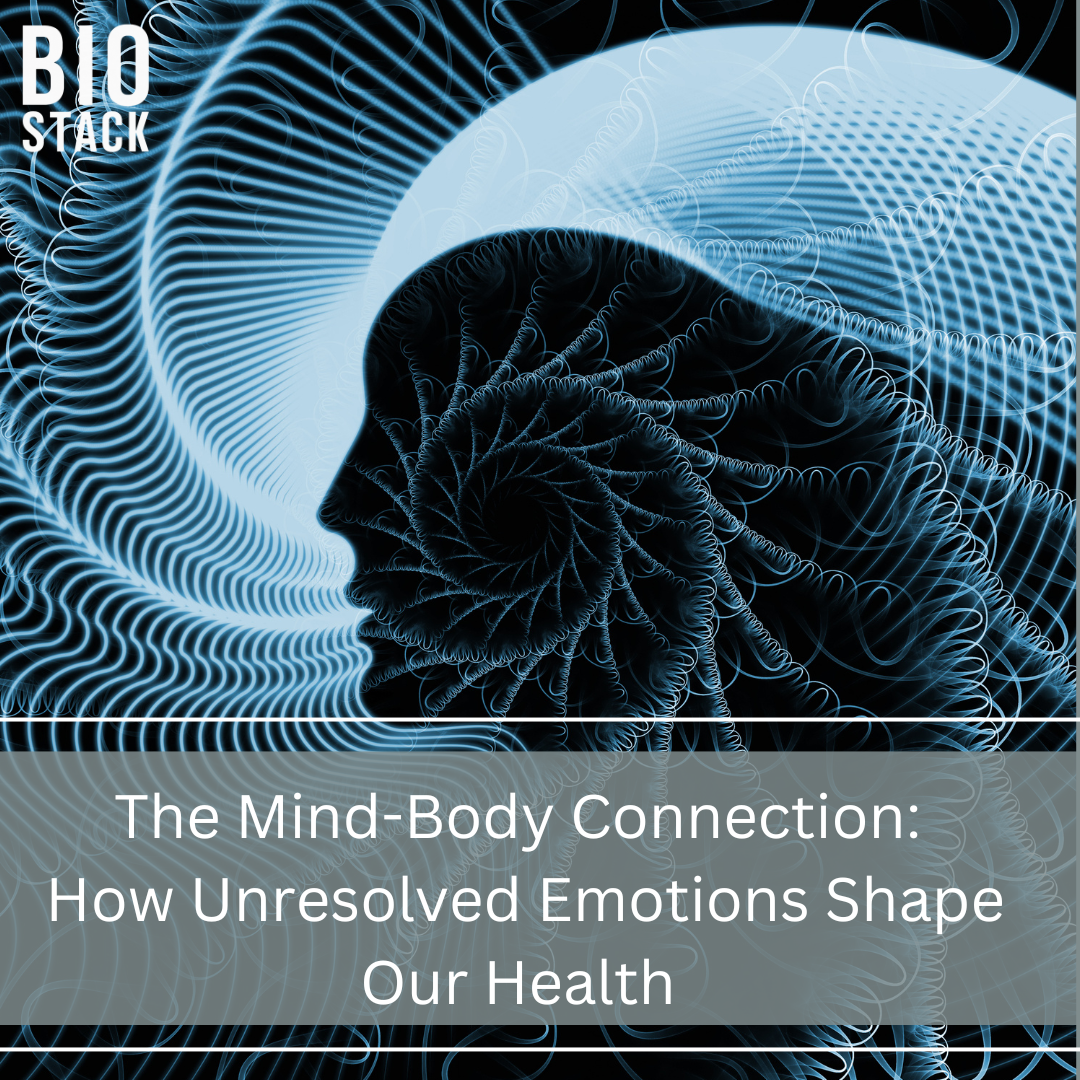
The Mind-Body Connection: How Unresolved Emotions Shape Our Health
Share
The Mind-Body Connection: How Unresolved Emotions Shape Our Health
Psychoneuroimmunology (PNI) is a fascinating and rapidly growing field of study that bridges the gap between psychology, neuroscience, and immunology, revealing the intricate connections between our minds and bodies. Over the past few decades, research has increasingly shown that our mental and emotional states have profound effects on our physical health. The core premise of psychoneuroimmunology is that our immune system, nervous system, and endocrine system are intimately linked, and emotional well-being plays a crucial role in our body’s ability to fight off illness.
In this blog, we'll explore the concept of psychoneuroimmunology, delve into the work of Dr. Gabor Maté, and discuss how unexpressed emotions can lead to illness, as illustrated in books like The Body Keeps the Score by Dr. Bessel van der Kolk.
What is Psychoneuroimmunology?
Psychoneuroimmunology is the study of how psychological factors (such as stress and emotions), the nervous system, and the immune system interact with one another. This interdisciplinary field emphasizes the mind-body connection, suggesting that our mental health can influence our immune function and overall physical health.
The term "psychoneuroimmunology" was coined in the late 20th century as scientists began to recognize the complex ways that mental states can affect physical health. Chronic stress, depression, anxiety, and other emotional conditions are not just “in the mind”—they have real, tangible effects on the body. For instance, stress hormones like cortisol can suppress immune function, making the body more susceptible to illness.
Research in this field has shown that individuals who experience prolonged emotional distress often have weakened immune systems, higher inflammation levels, and are at greater risk for diseases ranging from heart disease to cancer. In contrast, positive emotions and a strong sense of well-being can boost immune function and enhance overall health.
The Work of Dr. Gabor Maté
Dr. Gabor Maté is a renowned physician and author who has contributed significantly to the understanding of how unexpressed emotions and trauma contribute to illness. Maté's work focuses on the mind-body connection, and he emphasizes the importance of addressing emotional and psychological trauma to heal physical illnesses.
In his book When the Body Says No: Exploring the Stress-Disease Connection, Dr. Maté explores how chronic stress and repressed emotions contribute to the development of diseases such as cancer, autoimmune disorders, and multiple sclerosis. He draws on his clinical experience and numerous case studies to demonstrate that the body often manifests physical symptoms when emotional needs are not met, and trauma is left unresolved.
Maté highlights that societal pressures to suppress emotions, particularly feelings of anger, fear, or sadness, can have long-term detrimental effects on our health. For example, he discusses how people with chronic diseases often exhibit personality traits such as people-pleasing, denial of personal needs, and suppression of anger—all of which can lead to an overload of stress hormones in the body, contributing to illness.
Dr. Maté’s central message is that in order to truly heal, we must not only treat the physical symptoms of disease but also confront the emotional and psychological root causes. His work is particularly impactful because it acknowledges that healing requires an integrated approach—one that addresses both the mind and the body.
The Role of Trauma in Illness: The Body Keeps the Score
The Body Keeps the Score: Brain, Mind, and Body in the Healing of Trauma by Dr. Bessel van der Kolk is another pivotal book in the field of mind-body medicine, particularly in relation to trauma. Van der Kolk is a psychiatrist and trauma expert who has dedicated his career to studying how trauma affects the brain and body.
In this book, Dr. van der Kolk explains that trauma, especially when unacknowledged and unprocessed, can profoundly alter the brain’s structure and functioning, leaving individuals more vulnerable to physical illnesses. He explores how trauma can dysregulate the autonomic nervous system, leading to chronic states of hyperarousal (fight or flight) or hypoarousal (freeze), both of which contribute to a range of health issues such as chronic pain, autoimmune diseases, gastrointestinal problems, and cardiovascular issues.
One of the key insights from The Body Keeps the Score is that trauma is not just a psychological experience—it becomes embedded in the body. Van der Kolk explains how trauma survivors often carry the physical manifestations of their emotional wounds, even if they are not consciously aware of them. This is where the concept of "the body keeps the score" comes in—the body remembers and holds onto unprocessed trauma, leading to chronic tension, pain, and illness.
For example, many trauma survivors experience heightened inflammation and an overactive immune response, both of which can lead to autoimmune diseases or exacerbate existing conditions. The constant state of alert in the nervous system due to unresolved trauma also takes a toll on the body's ability to repair itself, weakening the immune system over time.
Van der Kolk argues that in order to heal from trauma, one must engage both the mind and the body in therapeutic processes. Practices like yoga, mindfulness, EMDR (Eye Movement Desensitization and Reprocessing), and somatic experiencing are all powerful ways to help trauma survivors reconnect with their bodies and begin the process of healing.
The Impact of Unexpressed Emotions
Both Dr. Gabor Maté and Dr. Bessel van der Kolk highlight the crucial role that emotions play in our physical health. Unexpressed emotions, particularly those stemming from trauma or prolonged stress, can create a cascade of physiological changes that increase the risk of illness.
Here are some of the ways unexpressed emotions can make us ill:
-
Chronic Stress Response: When emotions such as anger, sadness, or fear are suppressed, the body enters a state of chronic stress. This triggers the release of stress hormones like cortisol and adrenaline, which, in small doses, are necessary for survival. However, when released constantly over time, these hormones suppress the immune system, increase inflammation, and contribute to the development of chronic diseases such as heart disease and diabetes.
-
Inflammation: Suppressed emotions can lead to a prolonged inflammatory response in the body. Inflammation is a key factor in many chronic diseases, including cancer, arthritis, and heart disease. Studies have shown that people who regularly suppress their emotions are more likely to have higher levels of inflammatory markers in their bodies.
-
Weakened Immune System: The immune system is directly influenced by emotional states. Chronic emotional suppression weakens the immune system's ability to fight off infections and diseases, making individuals more susceptible to illnesses such as the flu, autoimmune disorders, and even cancer.
-
Chronic Pain: Many individuals with unexpressed emotions, particularly those related to trauma, experience chronic pain. Conditions such as fibromyalgia, migraines, and back pain are often linked to emotional stress. The body manifests emotional pain as physical pain, especially when emotions are not consciously acknowledged or processed.
-
Psychosomatic Symptoms: Psychosomatic illnesses are physical symptoms that are caused or exacerbated by mental factors such as stress and emotional suppression. For example, irritable bowel syndrome (IBS), chronic fatigue syndrome, and tension headaches are often linked to unexpressed emotions. In these cases, addressing the underlying emotional issues is crucial to relieving the physical symptoms.
Healing Through Expression
The key to preventing unexpressed emotions from making us ill lies in healthy emotional expression. Both Dr. Maté and Dr. van der Kolk emphasize that healing requires acknowledging and expressing our emotions in safe and constructive ways. Here are some strategies to help process and express emotions for better physical and emotional health:
-
Mindfulness and Meditation: Mindfulness practices, such as meditation, help individuals become more aware of their emotions in the present moment. By observing emotions without judgment, individuals can learn to process them rather than suppress them.
-
Therapy: Engaging in talk therapy or trauma-informed therapies such as EMDR or somatic experiencing can help individuals process unresolved emotions and trauma, leading to both emotional and physical healing.
-
Creative Expression: Artistic activities such as writing, painting, or music can provide an outlet for expressing emotions that may be difficult to articulate verbally. These forms of creative expression are powerful tools for emotional release and healing.
-
Physical Movement: Movement-based practices like yoga, tai chi, or dance allow individuals to reconnect with their bodies and release emotions that are stored physically. These practices can help balance the nervous system and promote emotional well-being.
Psychoneuroimmunology offers a compelling framework for understanding the profound connection between our emotions and our physical health. The work of Dr. Gabor Maté and Dr. Bessel van der Kolk highlights how unexpressed emotions, particularly those stemming from trauma, can manifest as illness. By addressing both the emotional and physical aspects of our well-being, we can pave the way for true healing and prevent the body from bearing the burden of our unexpressed emotions.
